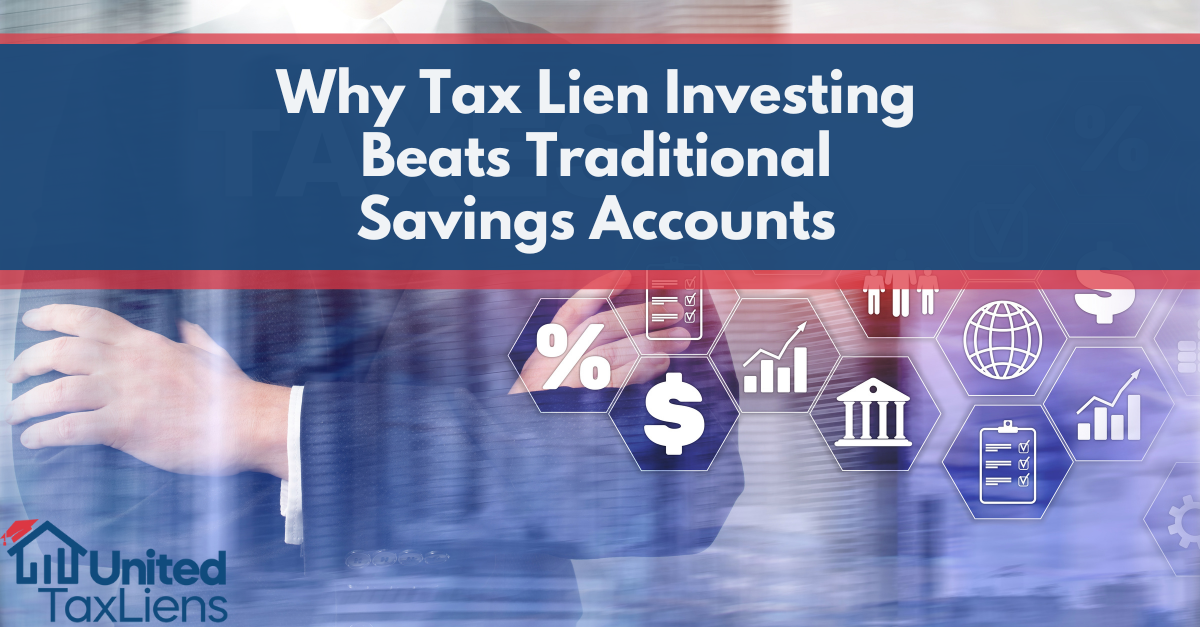In today’s financial climate, many traditional savings accounts offer abysmally low interest rates, typically between 0.01% and 0.5% APY. While they provide liquidity and a sense of security, they do little to grow wealth. In fact, they often fail to keep up with inflation. For anyone looking to achieve meaningful returns without diving into the rollercoaster of the stock market, tax lien investing offers a compelling alternative.
Tax lien investing is a legal and strategic method of earning income backed by real estate and enforced by government statutes. It offers fixed returns, often times higher than a savings account, and provides multiple paths to profit.
Why Traditional Savings Accounts Fall Short
The numbers paint a stark picture. A $10,000 deposit in a savings account earning 0.25% APY returns just $25 a year. That’s hardly growth, especially when the average inflation rate sits around 2–3%. Over time, your money loses purchasing power. Savings accounts serve an important role in emergency funds, but for investors with idle capital, they represent a major opportunity cost.
Even when interest rates tick up, banks rarely pass the benefit to savings account holders. That means smart investors look elsewhere for returns that outpace inflation—and tax liens fit that bill.
What is Tax Lien Investing?
When a property owner fails to pay their property taxes, the local government needs to recoup the shortfall. Instead of seizing the property outright, they place a lien on it and auction off that lien to investors. When you buy a tax lien, you’re paying the unpaid taxes on behalf of the owner. In exchange, you earn a legally mandated interest rate when the owner repays the debt.
Redemption periods and rates vary by state. For example:
- Florida: Interest rates are bid down from 18% per year, meaning you can earn up to 18% depending on auction competition.
- Iowa: Offers a 2% monthly interest rate, or 24% annually.
- Texas: Pays a flat 25% penalty regardless of how quickly the lien is redeemed—often making it the most sought-after state for rapid returns .
These are just a few examples. The rates are often fixed by statute and don't fluctuate with the market like bank interest does.
How Returns Compare
Let’s break this down. While a savings account offers maybe 0.25% APY, many tax lien investors report average annual returns of 8% to 20%, depending on strategy and state.
It’s important to remember that tax liens aren’t always held for a full year. Many redeem within months. For instance, if you purchase a lien in Florida at a 12% rate and it’s redeemed after six months, you’ve earned a 12% return in half a year—effectively 12% annually.
In a scenario where an investor holds 10 liens at $1,000 each, and even half of them redeem within the first year, that’s far better than any savings account.
Security You Can Count On
Unlike unsecured bank deposits (FDIC insurance aside), tax liens are backed by real estate. If the lien is not repaid during the redemption period, the investor may initiate foreclosure and potentially acquire the property.
Moreover, tax liens typically hold super-priority over mortgages and other liens. That means investors are paid before most other creditors during redemption or foreclosure
Are There Risks?
Absolutely. Tax lien investing is not completely passive. Risks include:
- Delayed redemption – your capital may be tied up for 1–3 years.
- Property condition – if you end up foreclosing, the property might have issues.
- Research time – you’ll need to evaluate the property and understand the local market.
- State-specific laws – each jurisdiction has different rules on interest rates, redemption periods, and foreclosure timelines.
But with proper due diligence, these risks are manageable, and the returns more than justify the effort.
Who Is This Right For?
Tax lien investing is great for:
- Individuals with savings beyond their emergency fund.
- Investors seeking low-risk, high-yield options.
- People looking for alternatives to low-interest CDs or bonds.
- Retirees seeking steady income without high volatility.
Getting started doesn’t require a fortune. In some counties, you can buy liens for a few hundred dollars. However, $5,000–$10,000 gives you room to build a more diversified lien portfolio across states.
Final Thoughts
Tax lien investing provides a rare combination of high returns, legal protection, and collateral-backed security—all while remaining accessible to everyday investors. It doesn’t replace traditional savings accounts, but it’s an ideal supplement for those ready to make their money work harder.
Where your savings account quietly earns you $25 per year, tax lien investing could return hundreds, or even thousands, depending on your strategy and state selection.
If you're looking to protect your capital, beat inflation, and potentially grow your wealth faster than banks will allow, it may be time to consider making tax liens a part of your broader financial plan.
This blog is for informational purposes only and should not be relied upon as financial or investment advice. Real estate investing carries risks, and individual results will vary. Always consult with your team of professionals before making investment decisions. The authors and distributors of this material are not liable for any losses or damages that may occur as a result of relying on this information.











